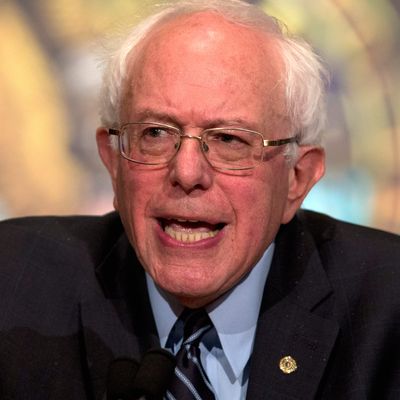
Ask ten pundits why it would be a bad idea for Democrats to nominate Senator Bernie Sanders, and nine will give you some variation on the theme that the man simply is not electable. That may or may not be true, but there is actually not a lot of empirical evidence suggesting that swing voters are repelled by him or that he would lose a lot of Democrats.
The first post-Thanksgiving national poll, from Quinnipiac, provides some counterevidence to the Bernie-can’t-win assumption. It shows him actually leading every named Republican candidate in general-election trial heats by margins equal to or greater than Clinton’s (his leads over Carson and Cruz are literally twice as large as HRC’s). Sanders also has the best favorability ratio — +13 — among all registered voters of any candidate in either party.
The Vermont senator continues to benefit somewhat from being unfamiliar to voters; his unfavorability numbers might never match Clinton’s unless he actually got the nomination. But among Democrats, who know him better than others, there’s just not much of an indication that he scares or offends real voters. In the Quinnipiac survey, when asked if there is a candidate they definitely cannot support, only 7 percent of Democrats named Sanders, and the number only rose to 11 percent among self-identified moderate/conservative Democrats. By contrast, the “definitely cannot support” percentage among Republicans was 26 percent for Trump, 21 percent for Bush, and in double digits for seven other candidates.
Could Sanders become unelectable if he won the nomination and was subjected to hundreds of millions of dollars of negative ads shrieking about his self-defined “democratic socialism” or this or that eccentric position taken at some point in his long career as a lefty gadfly? Perhaps, particularly if the mainstream media — which typically has a more important impact on presidential general elections than paid ads — contributes to the shrieking.
But right now Sanders’s problem isn’t electability, but simply that the disdain many left-bent activists have for Hillary Clinton is not shared by rank-and-file Democrats (or elected officials, for that matter). In the new Q-Pac poll (which shows her leading Sanders by precisely a two-to-one margin, 60 percent to 30 percent), Clinton’s favorability ratio among Democrats is 85-to-11. Sanders’s ratio is an impressive 68-to-7 as well, but it may not matter if he cannot find and exploit some Clinton vulnerability among the voters who will decide their fate.






























